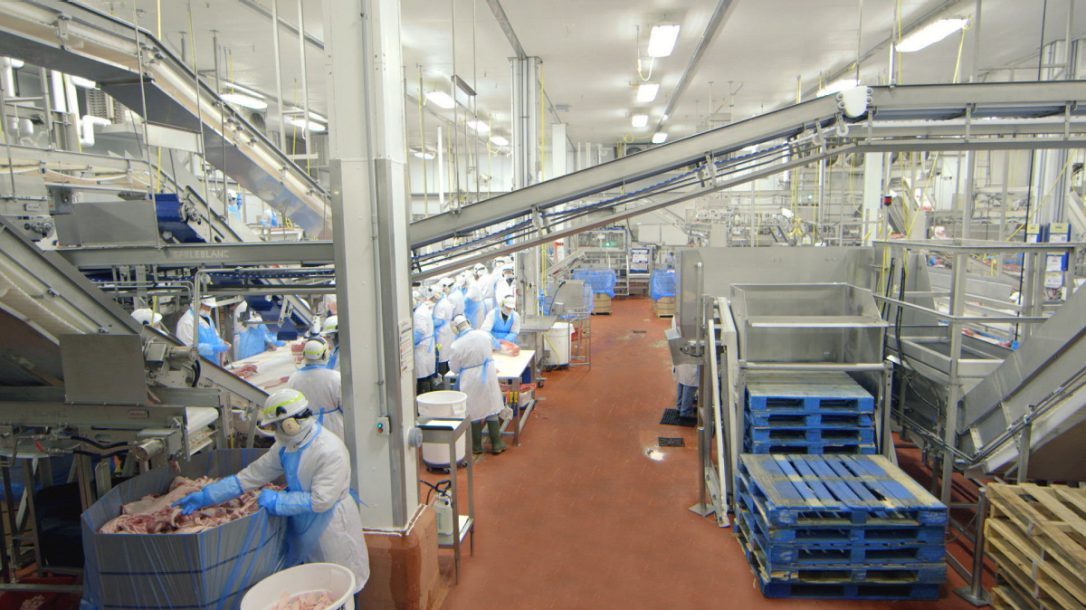Why Canadian Meat Plants Want Permanent Residency for Migrant Workers

Doing his rounds on the floor of the meat processing plant, Tony Morreale points to the “empty holes” on the production line, where positions are unfilled because of the meat cutter shortage
By Nicholas Keung – The Star.com
Outside Conestoga Meats, a huge hiring sign has become a fixture in front of the 115,000-square-foot facility located in this community near Kitchener. The plant processes more than 30,000 hogs a week, slaughtering the swine, derinding, deboning and slicing them into primo cuts for Canadian grocery chains and for export to China and Japan.
“The hiring sign has become part of the grass for me,” said Morreale, Conestoga’s vice-president of operations, zigzagging around the conveyor belts carrying carcasses to be cut by butchers wearing helmets, earmuffs, goggles and white robes.
“We just can’t find enough Canadians to do the job,” said Morreale, whose company has 950 employees, including 70 temporary foreign workers.
“The industry is such that we have difficulties attracting and retaining individuals,” said Morreale. “We have temporary foreign workers, but these are year-round jobs and we want them to stay permanently.”
Morreale and Canada’s $6 billion meat processing industry are just the latest to call on Ottawa to ease the access to permanent residency for their migrant workers. Earlier this fall, Canadian mushroom growers, who employ 4,330 people and generate $1 billion in sales a year, issued a similar plea.
Both industries have experienced perennial labour shortages because they are located primarily in rural Canada, which has been plagued by an aging population and outmigration of youth. Migrant workers have become a lifeline — a complement to the work force that keeps those operations running.
Those calls follow a recent Toronto Star series, The Hands that Pick Your Food, which found Canada has been increasing its reliance on migrant workers in the agri-food sector and that the lack of access to permanent residency can expose workers to abusive and exploitative working conditions.
“The meat industry is experiencing a perennial labour shortage and is asking Ottawa to ease the access to permanent residency for their migrant workers”
The meat industry currently employs 66,330 people, and Ron Davidson, a spokesperson for the Canadian Meat Council, estimates some 2,000 of them are migrant workers. A recent survey of 15 of the country’s largest meat plants identified a shortage of 1,500 workers. The industry, mostly unionized, has the same pay scale for both foreign and Canadian workers, who earn between $14 and $18 an hour.
Davidson said meat-cutters, the majority of them unionized full-time positions, also have medical, dental and eye care coverage as well as retirement pensions.
But, he says, the labour gap persists
“Canadians don’t want to move to a rural environment and we can’t put a slaughterhouse in a city. It is arduous work and many Canadians don’t find it pleasant,” he said.
Even offering skills development programs haven’t worked. “We tried to put together a college diploma program to train Canadians, but we had to cancel for the lack of interest,” said Davidson. “Not everybody can do it. You need the skills to do the right cuts. You need food safety knowledge. It takes months of training.”
Raising wages is also not an option.
“There is no tariff and quota for the import of meat,” said Davidson. “We have to stay globally competitive or we are not going to have a domestic meat industry at all.”
Jennefer Griffith, executive director of the Food Processing Human Resources Council, said the temporary foreign worker program is just a band-aid fix to the meat industry’s labour gap and Ottawa must change its policy to bring in the so-called “low-skilled” blue-collar workers as permanent residents as a long-term solution.
“The meat industry is not a sexy industry,” said Griffith. “Because of the perception of the job and its physicality, Canadians just aren’t interested.”
Blanket changes made by the former Conservative government to restrict the migrant worker program have not made things easier for the sector, Griffith said.
In response to reports of employers in the IT and mining sectors using migrant workers to replace Canadians, the Harper government raised the application fee employers have to pay for migrant workers from $200 to $1,000 — and capped the proportion of foreign workers at up to 10 per cent of a company’s work force.
To make the situation worse, the Liberal government changed the immigration selection system and made it more difficult for butchers to become permanent residents.
Under the old system, butchers could qualify as long as they had a job offer in Canada and possessed minimum proficiency in English or French. Now, the job offer doesn’t give them an edge.
Mauritian retail butcher Michael Marjolin came to work at Conestoga in 2015 under the low-skilled foreign worker program and applied for permanent residency in early November.
Serhiy Levytskyy, left, and Michael Marjolin are working as retail butchers at Conestoga Meats, but uncertain of their future. (ANDREW FRANCIS WALLACE/TORONTO STAR)
He scored 420 points under Canada’s Express Entry program for skilled workers because he got 100 bonus points from having French as his first language and have a brother in Canada. (His score is close enough to the 439 passing mark in the latest selection draw.)
“I love this job and I want to stay here and continue to work for Conestoga,” said the 36-year-old, who has nine years of experience in meat cutting.
His colleague Serhiy Levytskyy, came here from Ukraine in October 2016 after working as a retail butcher in Italy for nine years, just before the federal government removed the 600-point advantage he had had prior to the changes.
“I came because I would be able to become a permanent resident with the job offer,” said the 34-year-old, who can do all the cuts, but now specializes in the highly-skilled loin carving. “Now I’m screwed, because I will have to leave Canada if my work permit cannot be renewed. It’s a stressful situation.”
It is also a stressful situation for Canadian employers such as Alberta-based Sunterra Farms, which has 1,000 employees and processes 3,500 pigs a week.
Mark Chambers, Sunterra’s production manager, said the company has to submit a new labour market impact assessment application to renew the work permit of a migrant worker, which expires every year. The process is tedious and involves advertising the jobs to Canadians and filling out page after page of forms, he said.
“We would love to add another new plant if we could find the workers.
“The (permit) extension can be turned down and the decisions are arbitrary,” noted Chambers, who also co-chairs Canada’s Agriculture and Agri-food Labour Task Force. “That’s what’s preventing us from growing.”
Federal Immigration Minister Ahmed Hussen would not comment for the story.
Pauline Zwiers, vice-president of human resources at Conestoga Meats, said the company has tried repeatedly to attract and retain Canadian workers: relocation assistance, busing in workers from urban centres, reaching out to newcomer communities for recruitment, expanding the human resources department to improve service and introducing leadership development training.
At one point, she said, Conestoga hired Canadian workers indiscriminately and the turnover rate hit 39 per cent. Now, their turnover rate stands at 25 per cent, compared to just 4 per cent among the foreign workers.
“The foreign workers are supplementing our workforce,” said Zwiers. “We need the stability to facilitate our growth. It’s not a temporary need. They are already here in Canada and deserve the opportunity to stay.”
By Nicholas Keung – The Star.com













